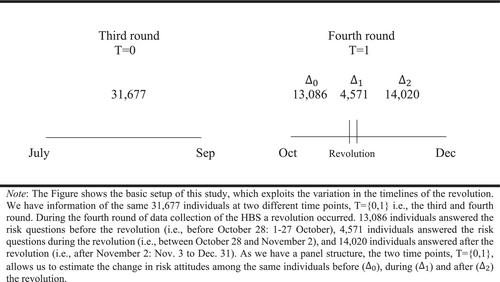革命会改变风险态度吗?布基纳法索的证据
IF 1.7
4区 经济学
Q3 DEVELOPMENT STUDIES
引用次数: 0
摘要
2014 年,一场民众起义引发了推翻布基纳法索现任总统的革命。我们调查了个人的风险态度是否因这场革命而改变。我们通过风险态度的主要决定因素:性别、年龄和教育水平来研究这种影响。分析以独特的面板调查数据为基础,使我们能够跟踪相同个体在革命前、革命期间和革命后风险态度的变化。我们的研究结果表明,在革命期间,个人会变得厌恶风险,但在革命结束后,他们的风险态度又会恢复到革命前的水平,并且略有上升。本文章由计算机程序翻译,如有差异,请以英文原文为准。

Does revolution change risk attitudes? Evidence from Burkina Faso
A popular uprising in 2014, led to a revolution that overthrew the sitting President of Burkina Faso. We investigate if individuals' risk attitudes changed due to this revolution. We examine this impact by the main determinants of risk attitudes: gender, age and level of education. The analysis is based on unique panel survey data, allowing us to track the changes in the risk attitudes of the same individuals before, during and after the revolution. Our results suggest that individuals become risk averse during the revolution but return back to their pre-revolution risk attitudes, with a slight increase in their risk attitudes, after the revolution is over.
求助全文
通过发布文献求助,成功后即可免费获取论文全文。
去求助
来源期刊

Journal of International Development
DEVELOPMENT STUDIES-
CiteScore
2.40
自引率
0.00%
发文量
109
期刊介绍:
The Journal aims to publish the best research on international development issues in a form that is accessible to practitioners and policy-makers as well as to an academic audience. The main focus is on the social sciences - economics, politics, international relations, sociology and anthropology, as well as development studies - but we also welcome articles that blend the natural and social sciences in addressing the challenges for development. The Journal does not represent any particular school, analytical technique or methodological approach, but aims to publish high quality contributions to ideas, frameworks, policy and practice, including in transitional countries and underdeveloped areas of the Global North as well as the Global South.
 求助内容:
求助内容: 应助结果提醒方式:
应助结果提醒方式:


